Betti Ono pt. 1: Building Cultural Permanence Through Art, Community, and Bold Leadership

Planning meeting for the Betti Ono mobile hub with the CAST, Betti Ono, and blink!LAB architecture teams
Developed in partnership between CAST & PJS Consultants
Interviews & content drafted by artist/writer dana e. fitchett with editing by CAST
This is part 5 of a 6-part blog series where we’ve spent time hearing from our partners in Oakland: Black Cultural Zone, Oakstop, and Betti Ono Foundation. Read why we’re highlighting these three Black Oakland natives and their remarkable work here.
About Betti Ono and Founder, Anyka Howard
Since 2010, Betti Ono has been a cultural hub in downtown Oakland, building power through culture by amplifying the lives, voices, and work of BIPOC, immigrant, and LGBTQ+ artists. The organization uses art, enterprise, and social impact strategy to establish cultural permanence and belonging; contribute to community well-being; and end gender-based violence. In the words of Founder Anyka Howard, “We celebrate everyday people and we have very strong values of being bold, unapologetic, and ambitious.” Betti Ono is building and activating practices that integrate arts and culture into the fabric of everyday life.

As a Black woman grounded in the East Bay, Anyka—who herself is a survivor of gender-based violence and domestic violence—has deep personal connections to her work. Her family migrated from New Orleans, LA and Greenville, MS to California in search of freedom and stability. Both her father’s and mother’s side eventually settled to the Bay Area: her father’s family left New Orleans for San Francisco and then to West and North Oakland; on her mother’s side, a cohort of families ended up living in community in Fresno, and eventually found their way to the East Bay. Her ancestors were committed to settling into a place to call home, free from racist attacks and other forms of violence, and Anyka carries on the tradition of placemaking.
“The history of that movement for liberation and sustainability is very much rooted in our ability to form and keep place,” Anyka clarifies.
“In my family history and our social-cultural history, our ability to form and create space has often come from being kept out of opportunities and forced to the margins. In order for our communities to have a sense of belonging, we need to have permanent spaces to bring our communities into, to learn, to be educated, to practice our cultural rites of passage. We need the covering of physical space. It’s our human right—our civil right—to have the level of dignity of permanent homes, both to live in and to live out our culture in.”

To activate her personal and organizational mission, Anyka has cultivated a team of women of color artists and creatives, rooted in the Betti Ono mission and values and committed to the people they’re working to create impact for—a team that has lived experience navigating gentrification, displacement, redlining, systemic racism, and multiple forms of violence, and possesses the clarity of perspective that can result from such experiences. “As artists and cultural workers, we know all of that is part of the systemic constructs that keep us from being able to live and thrive and have futures,” Anyka says.
One of those constructs is the prioritization of profit over people. “There are principalities that believe more in the profit and the perception that real estate in Oakland should be generating profit for developers and other people who have deep pockets,” Anyka explains. And given the racialized nature of capital and access, this means that particular groups of people are likely to have more access while others are consistently kept out—and Black artists are often among those systemically kept out.
“Unless you have access to a significant amount of financial, social, and political capital,” Anyka points out, “there are gatekeepers who will say no—groups of people who’ve historically owned the parcels and properties available who may have other motives to continue to reinforce racialized structures.”

Outgrowing Their Space and Partnering with CAST
From the outset, Anyka had planned to secure a permanent cultural home for Betti Ono. Leading up to the COVID-19 pandemic, the cultural hub was in a primetime downtown location, in a Broadway storefront owned by the City of Oakland. But the work eventually outgrew the limitations of the one-room gallery space. She points to the resonance between her vision and CAST’s mission that drew her in, saying, “CAST’s purpose of helping to support arts and cultural organizations to secure permanent space is very critical. We’ve been wanting a pathway to partnership with CAST since inception.”

“We get moved around like chattel from place to place,” Anyka shares with frustration, “and every place that we end up in because of these societal conditions, we have to start over and recreate the conditions. I’m rooted in the reality that, in order to have a future and still be rooted here, we need these spaces. We’re not civically rooted or grounded without these visible, accessible places of belonging that say, ‘You are welcome. You are here. We see you. You belong.’” In pursuit of a more stable, community-controlled, and community-accessed cultural space, Betti Ono gave up their home of 12 years after the pandemic hit, and this offered a clear and natural point of entry for Betti Ono to deeply connect with CAST and begin a long-term relationship. By this time, the two organizations had already begun collaborating through CAST’s Dreaming Spaces initiative, a practice used to unearth and address artists’ self-defined needs and dreams around spaces for creative place making, keeping, and belonging. Anyka points to her participation in Dreaming Spaces as a crucial moment for Betti Ono, allowing her a sense of expansiveness that she couldn’t tap into in her otherwise busy day-to-day life of being a community-serving cultural worker—the space to imagine what Betti Ono could become. “Our relationship with CAST came out of that work,” she shares, “where we identified that having a mobile hub would be a temporary solution while we work on a long-term real estate vision, while still being able to connect directly with our community wherever we’re called.” She elevates the dispersal of Black folks across the region resulting from displacement as one motivating factor for a mobile solution.

“Dreaming Spaces work helped to visibilize a need for responsiveness and a need for this cultural work and activity to criss-cross the city and have more threads of connection.”
For the past year and a half, Anyka and her team have been working closely with CAST and blink!LAB Architecture, an Oakland-rooted research-based urban design and architecture practice. Betti Ono Operations Manager, Sango Tajima, underscores the value of working with blink!LAB. “Also a Black woman-led organization with aligned values,” she elevates, “blink!LAB has been integral in the design process. We started with Anyka’s personal and organizational storytelling, which opened up questions about environmental impact, accessibility, moving a structure from place to place and what that means for safety.” In this potent partnership, Betti Ono has been able to clarify the vision of what they want the mobile hub to look and feel like, creating a visual to model to potential partners.

“The mobile hub expands our geographic reach and capacity,” Anyka says, “And we’re still learning as we go about this way of cooperating and building towards a shared vision that can be operationalized and co-owned in ways that honor the mutuality and creates pathways for engaging in that mutuality. Together we’re recognizing the need to further clarify that so that it takes root and can be something that really feels collectivized.”
Anyka elevates crucial and complex questions like how to meet the needs of community partners while meeting Betti Ono’s organizational needs, and how to develop meaningful, clear, and intentional programming while also leaving room for community members to inform and shape the evolution of the work.
Hear more in our next story about what Anyka and Betti Ono have encountered as they work to deliver on their mission and about the impact of partnering with CAST.
Read the series
This six-part blog series was developed in partnership between CAST and PJS Consultants, with interviews and content drafted by artist/writer dana e. fitchett, and editing by CAST.
- Community Engagement
Recognize the Present to Repair the Future
An introduction to three Oakland partnership stories.
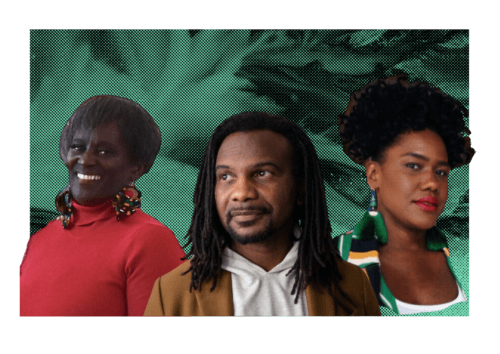
- Community Engagement
Betti Ono pt. 2: Amplifying Black Voices in Oakland’s Cultural Ecosystem
Betti Ono Foundation’s partnership with CAST and the ongoing fight for equitable access to resources for Black cultural workers in Oakland.

- Community Engagement
Oakstop pt. 1: Stabilizing Space and Place
The story of Oakstop and how they’re shifting the narrative for community work.
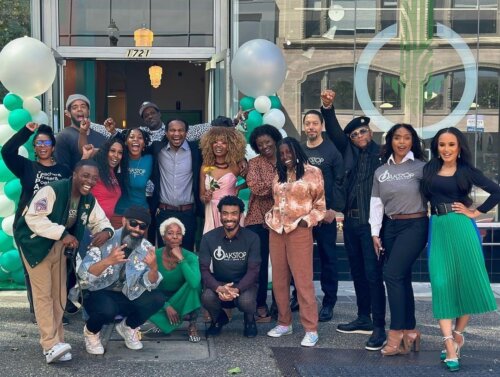
- Community Engagement
Oakstop pt. 2: Building Legacy and Creative Ecosystems
CAST and Oakstop reimagining community spaces through creative ownership.
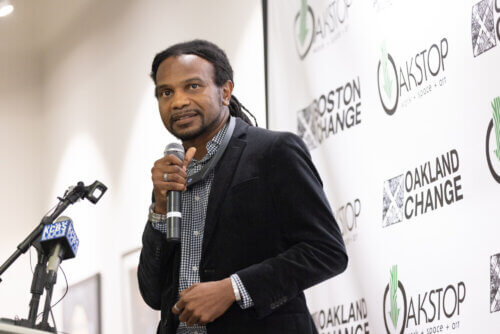
- Community Engagement
Black Cultural Zone pt. 1: A Demonstration of the Power of Hope
The story of Black Cultural Zone and Liberation Park.
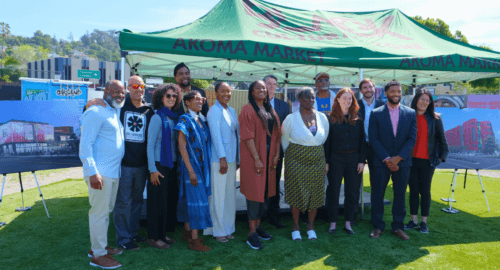
- Community Engagement
Black Cultural Zone pt. 2: Reparations as Requisite for Reimagining
Working with BCZ and learning to take more risks.
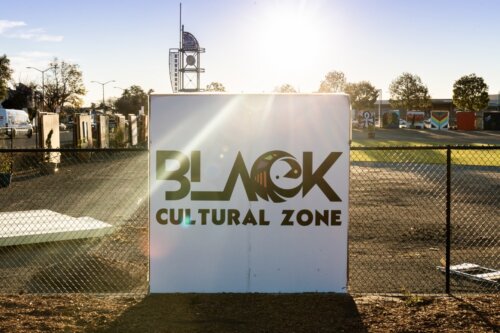
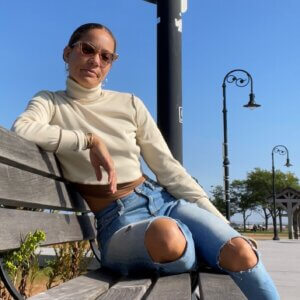
About dana e. fitchett
dana e. fitchett is a trans-disciplinary artist whose practices are grounded in listening and cultivating new languages in service of alignment, integrity, and freedom. Within and outside of PJS Consultants, dana writes and edits for individuals and community organizations working for transformation and justice by way of truth and reconciliation. As Founder and Creative Director of dance collective, Movement for Liberation; teacher of her original Groovement classes; and in her visual art and transcription processes, dana works in and in conversation with the expressive legacy of the African diaspora. Also a novice music producer and practiced plant-based foodmaker, she holds a certificate in nonprofit management and leadership; a bachelor’s degree in urban studies; and a master’s of fine art in interdisciplinary art, and spends most of her time between Boston, Brooklyn, and Oakland.




